After choosing a controversial president despite heavy student and faculty opposition, University of Florida leaders are warning that confidentiality concerns pose a major hurdle for US higher education in recruiting top-tier candidates.
During a tense gathering, the board of trustees at Florida’s flagship institution voted to install Republican senator Ben Sasse as its next president, amid angry protests over Dr Sasse’s political positions and the degree of secretiveness surrounding his selection.
His selection followed the enactment of a law in Florida assuring all candidates for the presidency that their participation in the search process would stay confidential unless they became a named finalist.
“The process is the biggest problem here,” said Breann Garbas, a clinical assistant professor of physician assistant studies, “because we don’t know who those other candidates were.”
Ahead of the trustee vote, however, the board’s chair, Mori Hosseini, said that the new state law actually helped attract an astoundingly large number of top-tier candidates – including nine sitting presidents of US universities at the most research-intensive level, known as R1.
The 12 finalists also included seven presidents or provosts of institutions in the Association of American Universities – the grouping of the 63 most elite US research institutions.
If anything, Mr Hosseini said, Florida’s experience was showing that the new law may not have gone far enough. “The bottom line is, if we had run a process that required more than one finalist to be publicly disclosed, none – I say it again, none – of the top 12 people we interviewed would have stayed in the process. It’s that simple,” he said.
That led to a situation in which the entire 15-member search committee – including its five faculty members and one student member – agreed to back Dr Sasse as their consensus choice, only to have both the student government and the faculty senate at Florida pass resolutions rejecting the senator once his name became public.
Following a scheduled vote of approval by the statewide governing board, Dr Sasse was set to replace Kent Fuchs, who earlier this year asked to step down after seven years on the job, amid numerous instances of political interference in academic activities by the state’s Republican governor, Ron DeSantis, a likely 2024 US presidential candidate.
Mr Hosseini and his board were generally correct, said Michael Horn, a higher education strategist, in warning that presidents of prominent universities generally will not take the risk of letting their names be made public if they are not assured of winning an appointment at the institution recruiting them.
“The reality,” he said, “is that some of these presidents, they won’t get the job, and they'll be back at their institution, and then the institution is going to ask, ‘Does this person even really want to be here?’”
But the additional reality, said Mr Horn, a co-founder and fellow at the Clayton Christensen Institute for Disruptive Innovation, is that university communities don’t trust their governing boards, which consist heavily of political appointees.
“It’s why having a board that you trust, and is itself educated, and itself has time to invest in the process, is also really important,” Mr Horn said. “And a lot of the boards that I see these days are not deeply educated on the issues facing higher ed right now.”
Register to continue
Why register?
- Registration is free and only takes a moment
- Once registered, you can read 3 articles a month
- Sign up for our newsletter
Subscribe
Or subscribe for unlimited access to:
- Unlimited access to news, views, insights & reviews
- Digital editions
- Digital access to THE’s university and college rankings analysis
Already registered or a current subscriber? Login







